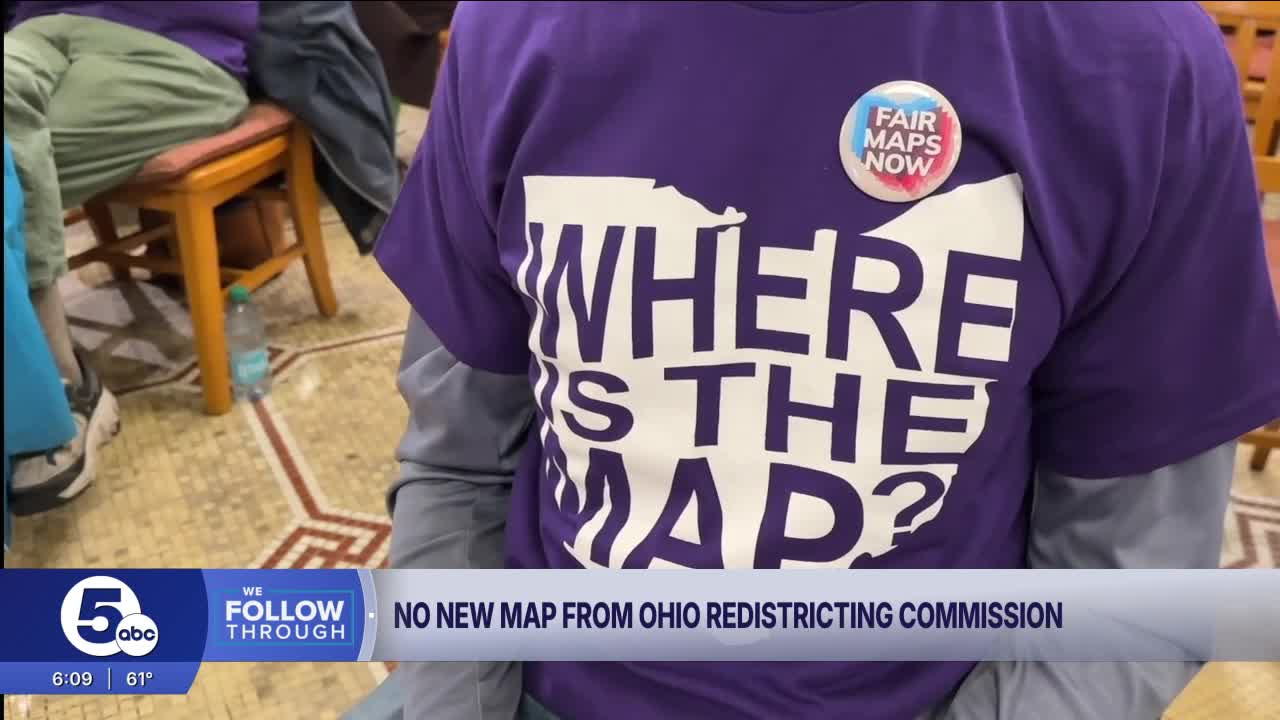COLUMBUS, Ohio — Ohio Republicans have still not proposed a congressional map, and it's a week away from their constitutional deadline to pass a bipartisan proposal. The first state redistricting commission meeting ended in jeers from the public, begging the GOP to "do their jobs." Now, Democrats in D.C. are discussing recourse if they believe the map passed is gerrymandered.
In front of the Ohio Redistricting Commission, Democratic leaders urged their colleagues to accept their proposed redistricting map, or at least negotiate with them to create a joint proposal before the Oct. 31 deadline.
"We've always been open to good faith, fair negotiation and compromise, but that requires both sides to show up," ORC Co-Chair Nickie Antonio (D-Lakewood), the Senate Minority Leader, said.
The ORC's five Republicans and two Democrats are tasked with drawing the state’s 15 U.S. House districts. The group is made up of two Republicans and two Democrats in the Statehouse. The three remaining seats include the governor, secretary of state and auditor.
Ohio's congressional districts are currently composed of 10 Republicans and five Democrats.
RELATED: Why Ohio GOP hasn't produced a congressional redistricting map yet
On average, Republicans win 55% to 45% of the vote over Democrats in Ohio. With that breakdown, Democrats proposed a map with eight seats leaning red and seven leaning blue.
The Republicans still haven't introduced their map yet, prompting dozens of citizens to wear shirts saying, "Where is the map?"
After Antonio and House Minority Leader Dani Isaacsohn testified in support of their map, Republicans swiftly adjourned the meeting.
"The ball is kind of in the Democrats' court to decide what deal they are or not willing to take... Certainly, you don't have to squint very hard to see what the contour of a deal could look like," ORC Co-Chair Brian Stewart (R-Ashville) said.
GOP leaders have told us they want at least 12 or 13 of the 15 districts to lean Republican.
"I think Republicans in our caucus generally think that we could have a map that includes some additional seats that Republicans could be competitive in," Stewart said.
Democratic Reps. Emilia Sykes of District 13 in Northeast Ohio, Marcy Kaptur of District 9 in Northwest Ohio and Greg Landsman of District 1 in Southwest Ohio are all at risk, Stewart confirmed.
But it's unclear how the GOP wants to do that, since they haven't submitted any proposals. I asked Stewart why the public can't see any drafts or proposals from Republicans.
"If there is a bill, a map, that has enough support to pass — that will get introduced and we'll have a debate and take a look at it," Stewart responded. "We're not going to just show all of our notes in public while you're trying to have discussions between legislative leaders about what they wouldn't support."
The Democrats are frustrated, arguing that the GOP is deliberately slowing this process.
"If it's slow-walked through the month of October, it leads to November, when the Republican majority can just pass a map of their own with only their members voting," Antonio said.
To meet the October deadline, at least four members of the ORC, including two Republicans and two Democrats, must approve. They must also have two public meetings if they intend to pass a map. If that fails, it goes back to the legislature.
Starting in November, Republicans can pass a map with just a simple majority, not needing Democratic support.
But just this weekend, U.S. House Minority Leader Hakeem Jeffries and Antonio talked on the phone about next steps, she said.
"They're looking at every option and every opportunity to be supportive of, should it come to a referendum, what that would look like," Antonio said.
If the lawmakers pass a map in November, voters can come together to put a referendum on the ballot, attempting to repeal the passed map and block its implementation. Eventually, a referendum campaign would need to get nearly 250,000 signatures in 90 days after the law has been signed and filed.
"There's a lot of energy for a potential referendum," Isaacsohn said. "I think people are fired up by the prospect of getting access to fair maps that they deserve."
When passing by the commission, the map isn't subject to a referendum.
"Is there any possibility that some deals might be made just to avoid a referendum?" I asked Stewart.
"I think, clearly, there are pros and cons to all the different paths that we have," he responded. "When I say I'm optimistic that phase two could result in a map, I am."
Another ORC meeting should take place this month, but it hasn't been announced yet.
Follow WEWS statehouse reporter Morgan Trau on Twitter and Facebook.






